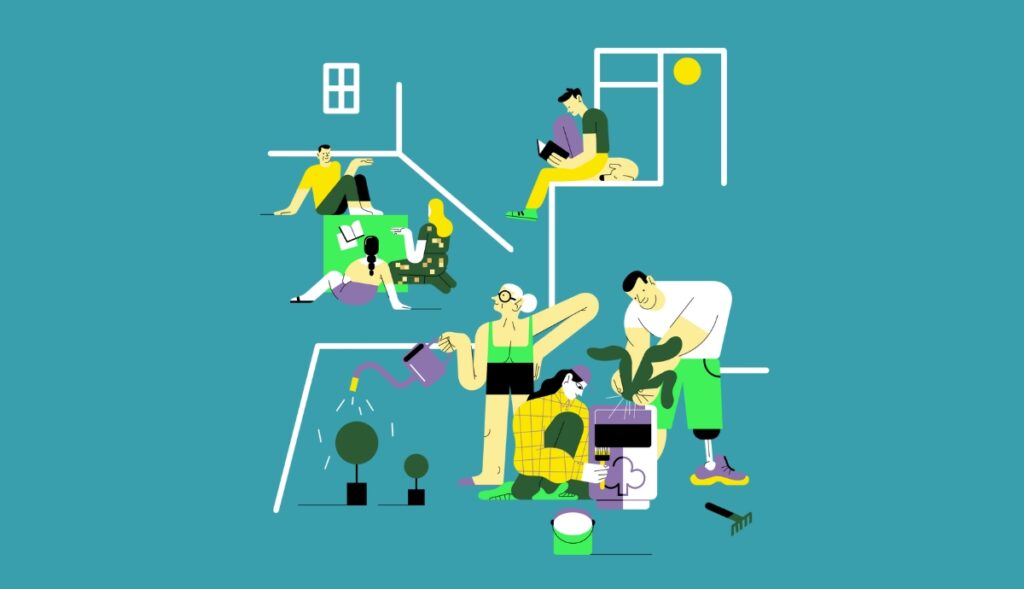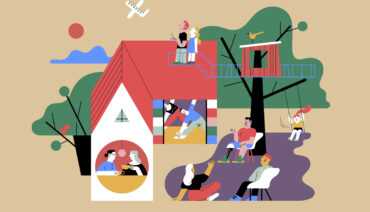
Understanding, unity and development of society require bringing people together, communicating and listening to each other, supporting each other and planning the future together. To make this a reality, public spaces are important – accessible premises where different people can come together and interact.
Cedos and Ukraine-Moldova American Enterprise Fund (UMAEF) announce the second wave of the competition for hromadas to create or renovate “community centers” and develop program activities of such centers.
The competition is part of the “Community reBuilding” project. During the first wave in 2023-2024, 311 applications were received, and 10 winners were selected. The finalists received grants of 1 million UAH each. Throughout the year, 10 mentors worked with them, and the teams’ projects were able to attract more than 8 million UAH in additional funding. Currently, 9 community centers have already started working. Part of the first wave of Community reBuilding was a public program that consisted of 6 online seminars attended by more than 1250 people.
“Community reBuilding” project won New European Bauhaus Prizes 2024 competition among projects from all countries of the European Union, the Western Balkans, and Ukraine. It took first place in the Rising Stars nomination in the category “Prioritizing places and people who need it most.”
What are “community centers”?
Community centers are accessible physical spaces for communication and interaction, support for local initiatives, and the involvement of all residents, including those from vulnerable groups. Such spaces promote solidarity through joint learning, volunteering, and planning for the future. In this way, community building helps to strengthen social cohesion and avoid social conflicts, which is especially important in times of war.
A key characteristic of community centers is their accessibility: physical and social. People from different social groups, regardless of their physical condition or social status, should be able to freely visit and use these spaces. They should be fully accessible to people with disabilities.
The program of activities of the centers may include educational opportunities (non-formal education, training programs, professional meetings, lectures and seminars), vocational training (for example, programs for veterans, internally displaced persons), psychological support programs, clubs and programs for children and youth, the elderly, as well as space for parents with children, etc.
What will the participants get?
On a contest basis, 10 grants of UAH 1,400,000 each will be awarded for the development of spaces and institutions that perform or will perform the functions of community centers described above. Funding should be distributed between two project components: 1) physical creation or renovation of community centers and 2) activities and events in the centers.
The project involves going from creating a concept, planning a step-by-step physical and activities improvement, budgeting to implementing projects.
Hromadas will also receive funds for these purposes:
- support from mentors with expertise in spatial design, inclusion, culture, communication and social interaction;
- assistance in identifying the needs of potential users of the spaces;
- consultations for planning events that will help attract a wider audience to the spaces – both during the renovation and after the opening.
The teams will work to create sustainable spaces that will help support and build communities in their hromadas. It will also be mandatory to develop a project for the physical transformation of the space, taking into account accessibility for people with limited mobility.
What are the stages of the project?
- First, the selected teams will undergo a hybrid training program. It will start around the end of September and will include online seminars and participation in a several-day offline workshop in October.
- The second stage will be to finalize the submitted concepts together with mentors to plan projects that will be implemented further. The finalized documents will include a spatial concept (how the physical renovation of the premises will take place), an event plan, and a budget. They will become annexes to the agreement and will serve as the basis for the first tranche of the grant.
- After signing the agreement, organizations will have about six months to physically renovate the space and develop center activities. The project provides for interim and final reporting.
- At the end of the project, tentatively in August 2025, each hromada will be able to present their experiences, successes, and lessons learned at a joint final conference.
What are the conditions of the competition?
- Applications are accepted from civil society organizations (officially registered public or charitable organizations). Partnership with local authorities will be a significant advantage in the evaluation of applications.
- Projects should be implemented in territorial hromadas with a population of up to 100 thousand people.
- Co-financing in the amount of at least 20% of the grant amount is a prerequisite. Co-financing can be not only in cash, but also, for example, in the form of materials or work, in any case, its financial equivalent must be calculated and indicated in the application.
- Projects and spaces associated with commercial, partisan, or religious organizations or purposes are not eligible for support under this call. In addition, projects that involve the development of spaces that are not physically and socially accessible will not be supported.
- The following criteria will be taken into account when selecting the winners: motivation and validity of the application, understanding of specific needs, previous experience, team capacity, and ability to implement the project. In addition, we will strive to represent different communities and projects by type and geographic location.
Interaction within the project involves active communication and cooperation between the hromada team, Cedos and UMAEF. For effective interaction, we ask you to identify a coordinator from the organization who will be the contact person for communications. In general, we expect that it will take at least 60 working days for the hromada to administer the project.
How to participate?
To apply for a grant, please fill out the Google form:
https://forms.gle/CYCMrK8qrcpK3s8NA
Application questions have a limit on the number of characters (characters with spaces) in the answers.
The list of questions to be answered in the Google form can be found in the document:
https://bit.ly/4bI1LK6
When?
- Applications will be accepted until 23:59 on August 6, 2024.
- Incomplete applications or those that do not meet the formal selection criteria will be filtered out at the technical selection stage.
- To clarify the information, we will invite the shortlisted hromadas to a video call in September.
- The selection results will be announced in the second half of September 2024.
- The expected project implementation period is by mid-August 2025.
How to ask a question?
If you have any questions about the application process, selection of participants, or the project in general, please send them to comrebuild@cedos.org.ua with the subject line “Questions”.
On July 25, at 15:00 Kyiv time, an information session will be held to present the terms of the competition and to allow you to ask questions. The event will be held online via Zoom, and the recording will be available publicly on the Cedos website. Register for the information session by following the link:
https://forms.gle/5AndhCjhTYms8eH58
Support Cedos
During the war in Ukraine, we collect and analyse data on its impact on Ukrainian society, especially housing, education, social protection, and migration







